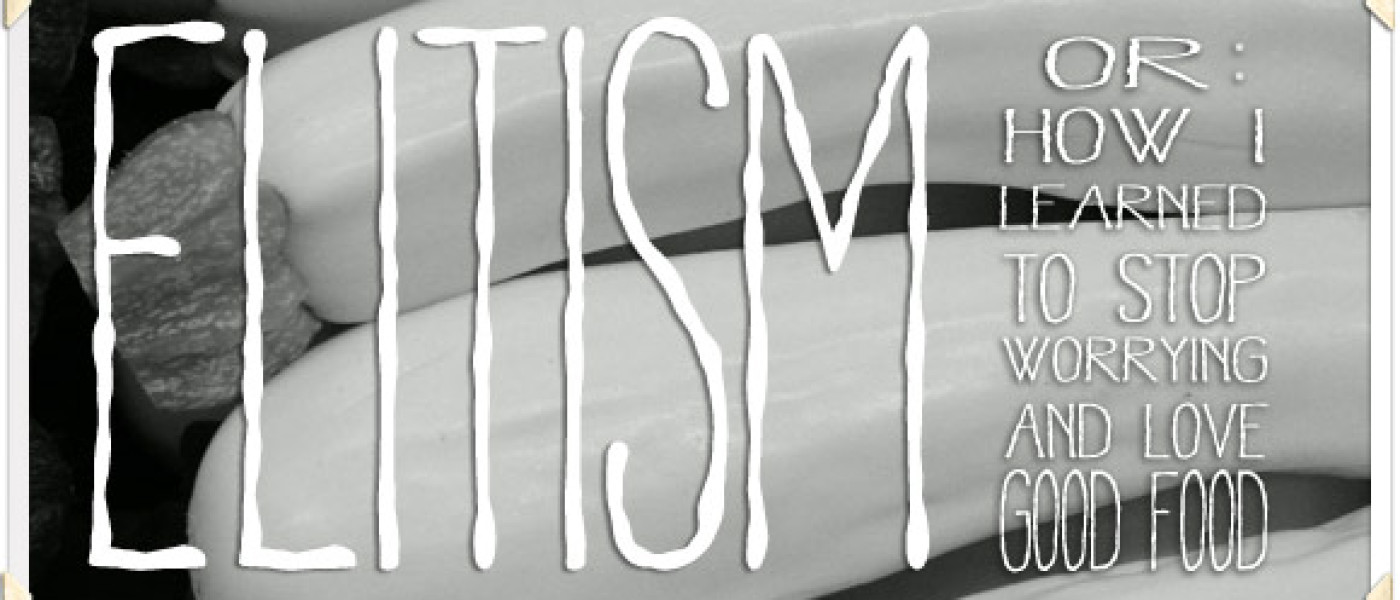“You’re such an elitist!”
That’s not the way my friends and family usually address me, but it’s something I’ve heard before in response to my eating habits. Labeling people in the food world seems to be popular, whether it’s foodies, locavores, gourmets or epicures. And let us not forget pretentious, elitist or other stereotypical shorthands (like my least favorite, “all those latté-sippers and arugula-eaters”). I’m not a fan of any of them for describing people like you and me who value family farm food. It feels like a lot of things are separating people in America right now, and good food shouldn’t be one of them.
Eating is something we all do every day. And the choices we make about what we eat have visible effects on our bodies; perhaps less obviously, those choices also affect our families, communities, farmers and beyond. By suggesting we all consider the effects of our food choices, I’m not saying you should get out a calculator to figure out the carbon footprint, or how much a farmer gets paid, for every grape you eat. Nor do you need to get paralyzed in an existential crisis at the supermarket trying to figure out whether you should buy “local,” “natural” or “organic” chicken breasts, or what those labels even mean. (As for me, I’d skip chicken breasts altogether and get chicken thighs because I think they taste better and they’re better for my budget!) But since we all need to eat, we might as well pay attention to what that food is and how it affects our health, our communities and the world.
What do I mean by good food? It encompasses a lot of different things, but for us at Farm Aid it always starts with food grown by family farmers. And one of our goals is to make it easier for more people to get this good food. I love this concept because it’s the exact opposite of the false “elitism” accusation. I want to see good food for all of us, whether we shop at supermarkets, farmers markets or convenience stores, and whether we’re eating out at the finest restaurants or at the corner pizza shop. And good food should also be accessible in our schools, hospitals and work cafeterias —everywhere people eat. As we get better systems in place for getting food from family farmers from the field to the table, the more inexpensive and available good food will be. How can eating with this goal in mind be elitist?
So how can we move on from labeling people to talking frankly about what prevents equity in our food system? Let’s start with the obvious: eating good food doesn’t make you a better (or worse) person than someone else. It’s not about bragging —that you’re a vegetarian or a locavore, or that you only eat organic— it’s about doing the best you can for yourself and your family. In doing that, we can expand the positive effects on our communities, family farmers, their communities and everyone else involved in providing good food for all. Sure, local and “farm-to-table” eating is a trendy thing right now, but that doesn’t mean it deserves to be put into the same fad category as cupcakes, putting bacon in everything, and old-timey mustachioed bartenders.
Unfortunately, for many people good food isn’t even an option. It’s either just not available in their area, or they don’t have the money to afford it. However, as we build the demand for good food, it opens markets to more family farmers to provide it, which means more people can access it. That means we can put more farmers on the land with opportunities for a viable career. And that means more good food in the marketplace, for more people.
Lots of people and organizations are working on new markets and other solutions to meet the good food needs for those who can’t access it now. Those solutions range from building gardens and teaching people how to grow in urban areas that don’t have a lot of food choice, to bringing farmers markets to those areas and enabling the redemption of Supplemental Nutrition Assistance Program (SNAP) benefits at the market. Some really innovative folks are doubling SNAP dollars when they’re spent at farmers markets. Another innovative program allows families to get reimbursed by their health insurance company for good food purchases. These programs are essential to changing our food system to make good food available to all. Are the folks behind these programs elitist? Doesn’t seem that way to me.
I think this whole idea of labeling people for the food they choose to eat, or for the food they advocate for others to eat, is all just a huge distraction from the very real issue of helping ourselves, helping family farmers and our communities. In the recently released documentary film Ingredients, Carol Boutard, a farmer in Oregon summed it up well; “Our tastebuds are there for a reason — they’re there to guide us to better nutrition. It’s not greed or gluttony to like the taste of food. It is a natural drive to nourish ourselves.”
Further Reading
- Read our Ask Farm Aid column on what “food hubs” are and how they are helping to get good food from family farmers onto more people’s plates.
- Read our Farmer Hero profile of farmers involved with The Local Food Hub, a non-profit organization working with over 50 family farms and food producers near Charlottesville, Virginia.
Next
The Local Food Hub



